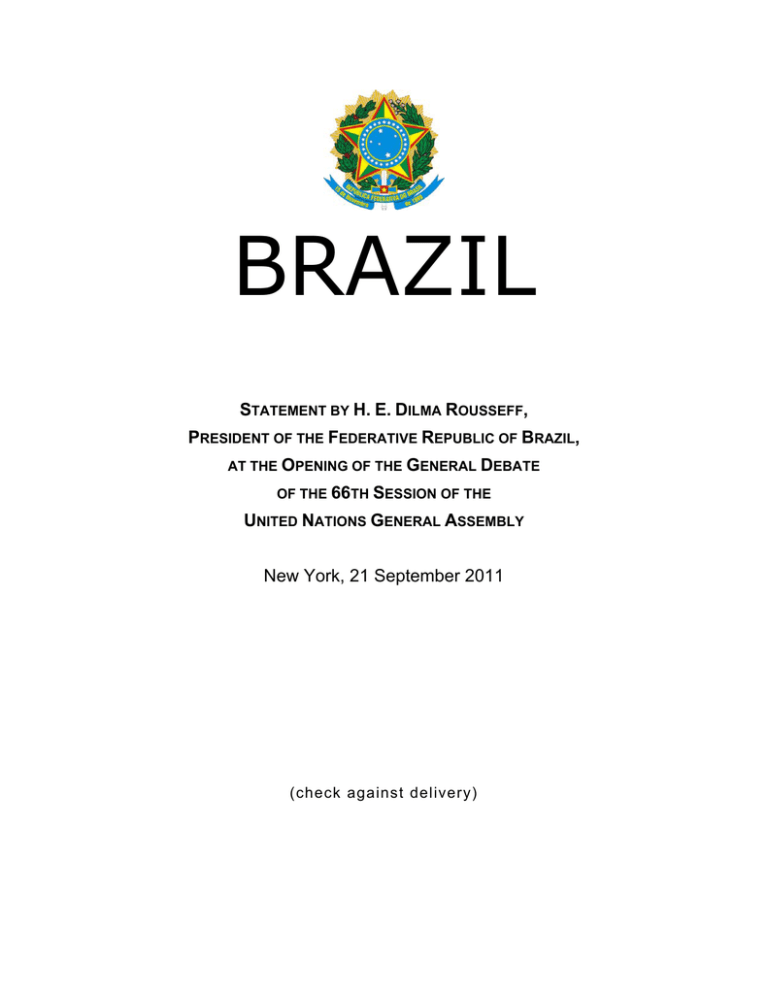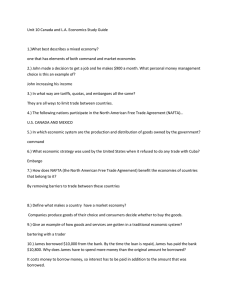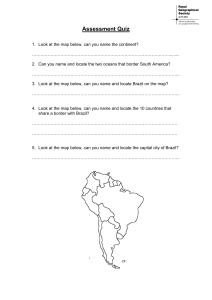BRAZIL S H. E.
advertisement

BRAZIL STATEMENT BY H. E. DILMA ROUSSEFF, PRESIDENT OF THE FEDERATIVE REPUBLIC OF BRAZIL, AT THE OPENING OF THE GENERAL DEBATE OF THE 66TH SESSION OF THE UNITED NATIONS GENERAL ASSEMBLY New York, 21 September 2011 (check against delivery) Mr. President of the General Assembly, Nassir Abdulaziz Al-Nasser, Mr. Secretary-General of the United Nations, Ban Ki-moon, Heads of State and Government, Ladies and gentlemen, For the first time in the history of the United Nations, a female voice opens the General Debate. It is the voice of democracy and equality reverberating from this, which has the commitment of being the most representative podium in the world. It is with personal humility, but with my justified pride as a woman, that I meet this historic moment. I share this feeling with over half of the human beings on this planet who, like myself, were born women and who, with tenacity, are occupying the place they deserve in the world. I am certain that this will be the century of women. In Portuguese, words such as life, soul and hope are feminine nouns. Two other words that are very special to me are also feminine: courage and sincerity. And it is with courage and sincerity that I wish to speak to you today. Mr. President, The world is going through an extremely delicate moment, which is also a great historic opportunity. We face an economic crisis that, unless it is overcome, could become a grave political and social rift. Such a rift would be unprecedented, capable of causing serious imbalances in the relationship among people and among nations. More than ever, the fate of the world is in the hands of its leaders - all of them, without exception. We can either unite and together emerge victorious; or we can emerge defeated. At this moment, it is not so important to know who caused the situation we face – after all, that is already sufficiently clear. Our focus must be on finding collective, rapid, and real solutions. This crisis is too serious to be managed by a small group of countries. Their governments and central banks continue to bear greater responsibility in taking the process forward. Yet as all countries suffer the consequences, all of them have the right to participate in the solutions. It is not for lack of resources that the leaders of the developed countries have not yet found a solution to the crisis. If you will allow me to say so, it is the lack of political resources and of clarity of ideas that are to blame. Part of the world has not yet found the balance between appropriate fiscal adjustments and proper and precise fiscal stimuli to demand and growth. They are caught in the trap that does not distinguish between partisan interests and the legitimate interests of society. The challenge posed by the crisis is that of replacing outdated theories, originating in an old world, with new formulations for a new world. While many governments shrink, unemployment – the bitterest face of the crisis – grows. There are already 205 million unemployed people in the world: 44 million in Europe and 14 million in the United States. It is vital that we fight this scourge and keep it from spreading to other regions of the planet. We women know better than anyone that unemployment is not just a statistic. It strikes at families, at our children, and at our husbands. It snatches away hope and leaves behind violence and pain. Mr. President, It is noteworthy that it is the president of an emerging country, a country experiencing practically full employment, who speaks here today in such stark terms of this tragedy that assails the developed countries in particular. Like other emerging countries, Brazil has thus far been less affected by the global crisis. But we know that our capacity to resist it is not unlimited. We are willing and able to help, while there is still time, those countries where the crisis is already acute. A new kind of cooperation, between emerging and developed countries, is a historical opportunity to redefine, with solidarity and responsibility, the commitments that govern international relations. The world faces a crisis that is at the same time one of economics, governance, and political coordination. There will not be a return to confidence and growth until we intensify coordination efforts between the Members of the United Nations and other multilateral institutions, such as the G-20, the IMF and others. The United Nations and these organizations must urgently send out clear signals of political cohesion and macroeconomic coordination. For example, fiscal and monetary policies should be submitted to mutual scrutiny, in order to avoid undesirable effects on other countries, avoiding defensive reactions that, in their turn, lead to a vicious circle. The solution of the debt crisis must be combined with economic growth. There are glaring signs that many advanced economies are on the threshold of recession, which will significantly hinder the solving of their fiscal problems. It is clear that right now, the priority of the world economy must be resolving the problem of those countries facing sovereign debt crises and turning back the current recessive tide. The developed countries must put in place coordinated policies to stimulate the economies that are extremely weakened by the crisis. Countries with a high surplus should strengthen their domestic markets and, as appropriate, adopt more flexible exchange rate policies, so as to contribute to the rebalancing of global demand. It is necessary to reinforce the regulation of the financial system and to control this inexhaustible source of instability. Controls must be imposed on the currency war through the adoption of floating exchange rate regimes. This means putting an end to exchange rate manipulation both by excessively expansionary monetary policies and by the stratagem of fixed exchange rates. The reform of multilateral financial institutions must proceed, with an increase in the participation of the emerging countries, who are chiefly responsible for growth in the global economy. We should fight protectionism and all forms of trade manipulation, for they increase competitiveness in a spurious and fraudulent manner. Mr. President, Brazil is doing its part. With sacrifices, but in a conscientious way, we are keeping government spending under strict control. This has generated a sizable fiscal surplus without compromising the success of our social policies or the pace of our investment and economic growth. We are taking additional precautions to buttress our ability to resist the crisis, by strengthening our domestic market through income distribution policies and technological innovation. For at least three years, Mr. President, Brazil has been reiterating, from this very podium, that we must combat the causes and not just the consequences of global instability. We have insisted that development, peace, and security are interrelated and that the Security Council’s strategies for achieving sustainable peace must be partnered with development policies. This is how we have acted with regard to our commitments to Haiti and to GuineaBissau. At the forefront of MINUSTAH, since 2004, we have promoted humanitarian projects that integrate security and development. With deep respect for Haitian sovereignty, Brazil is proud to contribute to the consolidation of democracy in that country. We are ready to cooperate with our brother and sister countries in the developing world in the areas of food security, agricultural technology, clean and renewable energy generation and in the fight against hunger and poverty. Mr. President, Since late 2010, we have witnessed a series of mass demonstrations that have come to be known as the “Arab Spring”. Brazil is the adopted homeland of many immigrants from the Arab world. Brazilians wholeheartedly support the search for an ideal that belongs to no culture, because it is universal: the ideal of freedom. The nations here united must find a legitimate and effective way to aid those societies that call for reform, while keeping their citizens in the lead of the process. We vehemently repudiate the brutal repression of civilian populations. Yet we remain convinced that for the international community, the use of force must always be a last resort. The quest for peace and security in the world cannot be limited to interventions in extreme situations. We support the Secretary-General in his efforts to engage the United Nations in conflict prevention through the tireless practice of diplomacy and the promotion of development. The world suffers today from the painful consequences of interventions that aggravated existing conflicts. They allowed terrorism to penetrate into places where it previously did not exist, gave rise to new cycles of violence and multiplied the number of civilian victims. Much is said about the responsibility to protect; yet we hear little about responsibility in protecting. These are concepts that we must develop together. For that, the role of the Security Council is vital - and the more legitimate its decisions are, the better it will be able to play its role. And the Council’s legitimacy increasingly hangs on its reform. Mr. President, With each passing year, it becomes more urgent to solve the Council’s lack of representativeness, which undermines its credibility and effectiveness. Former General Assembly President Joseph Deiss reminded me of an impressive fact: the debate on Security Council reform is entering its 18th year. We can delay no longer. The world needs a Security Council that reflects contemporary realities; a Council that brings in new permanent and non-permanent members, especially developing countries. Brazil is ready to shoulder its responsibilities as a permanent member of the Council. We have lived in peace with our neighbors for over 140 years. Together, we have embarked on successful processes of integration and cooperation. Through a constitutional provision, we have renounced the use of nuclear energy for non-peaceful purposes. I am proud to say that Brazil is a force for peace, stability and prosperity in its own region and even beyond it. In the Human Rights Council, our participation is grounded in our own history of overcoming adversity. We wish for other countries what we wish for ourselves. Authoritarianism, xenophobia, extreme poverty, capital punishment, and discrimination are all enemies of human rights. Violations are committed in all of our countries, without exception. We must recognize this reality – and we must all accept criticism. We should benefit from it and fearlessly criticize flagrant violations, wherever they occur. Mr. President, I warmly welcome South Sudan to our family of nations. Brazil is ready to cooperate with the youngest member of the United Nations and to contribute to its sovereign development. But I regret that today I still cannot welcome Palestine’s full membership in the United Nations. Brazil already recognizes the Palestinian State within the 1967 borders, in a manner consistent with United Nations resolutions. Like the majority of the countries in this Assembly, we believe that the time has come for Palestine to be fully represented here. The recognition of the Palestinian people’s legitimate right to sovereignty and selfdetermination increases the possibilities for a lasting peace in the Middle East. Only a free and sovereign Palestine will be able to heed Israel’s legitimate desires for peace with its neighbors, security in its borders and political stability in its region. I come from a country where the descendents of Arabs and Jews are fellow countrymen and live together harmoniously – which is as it should be. Mr. President, Brazil is strongly committed to a global, comprehensive, and ambitious agreement to fight climate change, under the auspices of the United Nations. For this to come about, countries must shoulder their respective responsibilities. We presented a concrete, voluntary, and significant emissions reduction proposal during the Copenhagen Summit in 2009. We hope to be able to make progress in the Durban meeting, supporting developing countries in their efforts to reduce emissions and ensuring that the developed countries will fulfill their obligations, with new targets under the Kyoto Protocol beyond 2012. We will have the honor of hosting the United Nations Conference on Sustainable Development – Rio + 20 – in June of 2012. Along with Secretary-General Ban Ki-moon, I reiterate the invitation to all Heads of State and Government to attend. Mr. President and my fellow women around the world, Brazil has found that the best development policy is combating poverty and that a true human rights policy must be based on reducing inequalities between people, regions, and genders. Brazil has progressed politically, economically, and socially without putting in jeopardy a single one of its democratic liberties. We have met almost all of the Millennium Development Goals well before 2015. Almost 40 million Brazilian men and women have risen out of poverty and joined the middle class. I am fully confident that by the end of my government, we will achieve our goal of eradicating extreme poverty in Brazil. In my country, women have been fundamental in overcoming social inequalities. Mothers play a central role in our income distribution programs. It is they who manage the resources that allow families to invest in the health and education of their children. Yet my country, like every country in the world, still has much work ahead of it when it comes to empowering women. I congratulate Secretary-General Ban Ki-moon for making women a priority during his tenure at the head of the United Nations. I welcome in particular the creation of UN-WOMEN and pay tribute to its ExecutiveDirector, Michelle Bachelet. Mr. President, I feel that here today, I represent all the women of the world. The nameless women, those who starve and cannot feed their children. Those who are wracked by illness and cannot receive treatment. Those who suffer violence and who are discriminated in their jobs, their societies, and their family life. Those who labor in the home to raise future generations. I add my voice to those of the women who dared to struggle, who dared to participate in politics and in the workforce, and who forged the political space without which I could not stand here today. As a woman who was tortured in prison, I know how important the values of democracy, justice, human rights, and liberty are. It is with the hope that these values continue to inspire the work of this House of Nations that I have the honor to open the General Debate of the 66th United Nations General Assembly. Thank you very much.




